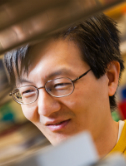The characteristics of astrocytomas and oligodendrogliomas are caused by two distinct and interchangeable signaling formats Journal Article
| Authors: | Dai, C.; Lyustikman, Y.; Shih, A.; Hu, X.; Fuller, G. N.; Rosenblum, M.; Holland, E. C. |
| Article Title: | The characteristics of astrocytomas and oligodendrogliomas are caused by two distinct and interchangeable signaling formats |
| Abstract: | Chronic platelet-derived growth factor (PDGF) signaling in glial progenitors leads to the formation of oligodendrogliomas in mice, whereas chronic combined Ras and Akt signaling leads to astrocytomas. Different histologies of these tumors imply that the pathways activated by these two oncogenic stimulations are different, and that the apparent lineage of the tumor cells may result from specific signaling activity. Therefore, we have investigated the signaling effects of PDGF in culture and in gliomas in vivo. In culture, PDGF transiently activates ERK1/2 and Akt, and subsequently elevates p21 and PCNA expression similar to chronic PDGF autocrine signaling in cultured astrocytes and PDGF-induced oligodendrogliomas in vivo. Culture experiments show that autocrine PDGF stimulation, and combined active Ras and Akt generate signaling patterns that are in some ways mutually exclusive. Furthermore, forced Akt activity in the context of chronic PDGF stimulation results in cells with an astrocytic differentiation pattern both in culture and in vivo. These data imply that these two interconvertible signaling motifs are distinct in mice and lead to gliomas resembling the two major glioma histologies found in humans. The ability of signaling activity to convert tumor cells from one lineage to another presents a mechanism for the development of tumors apparently comprised of cells from multiple lineages. Copyright © 2005 Neoplasia Press, Inc. All riqhts reserved. |
| Keywords: | immunohistochemistry; signal transduction; platelet derived growth factor; protein kinase b; controlled study; protein expression; proto-oncogene proteins; nonhuman; glioma; protein motif; animal cell; mouse; animals; mice; animal tissue; map kinase signaling system; animal experiment; animal model; astrocyte; in vivo study; cell differentiation; enzyme activation; phosphorylation; time factors; cell lineage; mice, transgenic; blotting, western; cell culture; brain; cell transformation; protein-serine-threonine kinases; platelet-derived growth factor; proto-oncogene proteins c-akt; autocrine effect; mitogen activated protein kinase 1; mitogen activated protein kinase 3; glia cell; plasmids; oligodendroglioma; ras protein; ras proteins; cycline; akt; cell stimulation; protein p21; proto-oncogene proteins p21(ras); astrocytoma; ras; mouse model; mitogen-activated protein kinase 1; mitogen-activated protein kinase 3; pdgf; trans-activation (genetics); glioma histology |
| Journal Title: | NeoPlasia |
| Volume: | 7 |
| Issue: | 4 |
| ISSN: | 1522-8002 |
| Publisher: | Elsevier Science Inc. |
| Date Published: | 2005-04-01 |
| Start Page: | 397 |
| End Page: | 406 |
| Language: | English |
| DOI: | 10.1593/neo.04691 |
| PUBMED: | 15967117 |
| PROVIDER: | scopus |
| PMCID: | PMC1501153 |
| DOI/URL: | |
| Notes: | --- - "Cited By (since 1996): 30" - "Export Date: 24 October 2012" - "CODEN: NEOPF" - "Source: Scopus" |
Altmetric
Citation Impact
BMJ Impact Analytics
Related MSK Work







